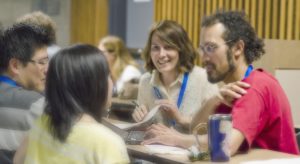Active Learning Activities
Active learning activities are tailored to specific learning outcomes and content. They incorporate one or more of the evidence-based strategies. Structured to expose their theoretical underpinnings, the activities can be used by practitioners and researchers alike.
Selected Filters:
- General
- Interdisciplinary
- Languages
- Social sciences
- History
- Humanities
- Biochemistry
- Biology
- Environmental science
- Jigsaw
- Reflective Writing
- Debates
- Game-Based Instruction & Gamification
- Problem-Based Learning
- Concept Mapping
- Two-Stage Exam
- Just in Time Teaching (JiTT)
- Toolkit
- Snowball
- Single class period (< 90 mins)
- Part of a semester (4-6 weeks)
























